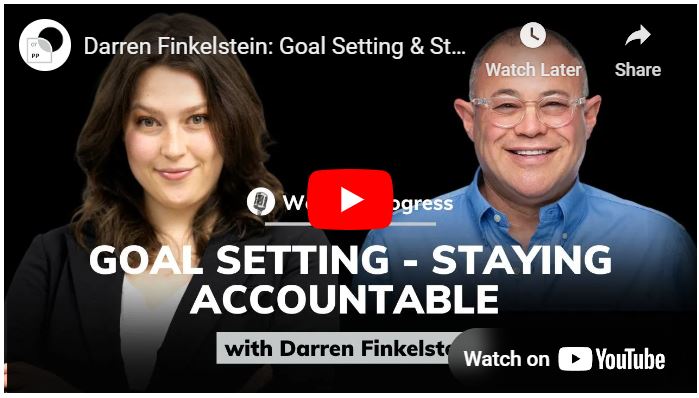Running a business isn’t just about launching a product or signing clients. It’s about staying up when things get tough, adjusting quickly, and staying steady through changes you didn’t see coming. That’s what separates businesses that last from the ones that burn out fast. Change is constant, whether it’s new tech, shifts in customer habits, or broader economic shifts. If your setup can’t shift with those changes, you’re always catching up instead of getting ahead.
Discover your Accountability Score and increase the probability of smashing your GOALS and Getting Sh!t Done!
Resilience isn’t about avoiding challenges. It’s about being able to handle them without losing steam. Entrepreneurs who build this mindset into their business model give themselves a much better shot at long-term success. You’re not preparing for one specific challenge but creating a way of working that lets you keep moving even when things go sideways. Let’s look at how to build that kind of setup, one that works under pressure and keeps growing when others stall out.
Understanding Market Volatility
Markets don’t stay still. That’s not new. Predicting the direction and timing of market fluctuations is a challenging task. Sometimes the shifts are subtle, like consumers slowly changing how they shop. Other times they hit like a sledgehammer, such as during supply chain messes or surprise inflation. These changes can quickly disrupt businesses, particularly those that have concentrated their resources in one area.
For entrepreneurs, this means always being on the lookout. Market volatility can affect how much money is coming in, what customers are expecting, how much suppliers cost, and how fast you can react when something major shifts. Confident planning can become more challenging, yet it also reveals those who are truly suited for the long haul.
Some common triggers for sudden changes include:
– Economic disruptions caused by interest rates, trade policies, and shifts in currency value
– Technology making old systems or products less relevant almost overnight
– Consumer behaviour moving unpredictably, especially in response to trends or values
– Political decisions or laws that alter what’s allowed or how an industry functions
– Natural disasters or global events that affect supply chains and operations
The upside to keeping a close eye on these factors? It lets you act early. If you’re spotting trends rather than chasing them, you’re more likely to make decisions that protect both the short-term and future shape of your business. For example, a business that spotted weakened supplier stability in one region might begin sourcing from multiple locations before others took the hit. That’s resilience at work, adjusting early before it becomes a scramble.
Understanding market volatility isn’t about forecasting every risk. It’s about recognising that conditions will change at some point and having a structure that doesn’t freeze up when that happens.
Core Elements Of A Resilient Business Model
You can’t make a business storm-proof, but you can make it flexible. A resilient business model doesn’t break when things don’t go to plan. A resilient business model adapts and continues to function effectively. Three key elements give a model this kind of strength: flexibility, diversification, and solid financial footing.
1. Flexibility
Being flexible means being able to adjust your plans quickly without throwing everything away. It doesn’t mean being reactive. It entails structuring your processes, teams, and tools to manage change with minimal stress. Such design might look like using systems that are easy to update, giving teams the power to make local decisions fast, or building workflows that aren’t tangled up in too many approval hoops.
2. Diversification
Spreading your risk makes a massive difference when something goes wrong. That could mean offering more than one product, targeting multiple markets, or having multiple income streams instead of relying on one. If one area takes a hit, the others can carry more weight and keep the business stable. It also opens the door to spot new opportunities earlier, since you’ve already dipped your toe in different markets.
3. Strong Financial Foundation
Resilient businesses keep a closer eye on how their money moves. They’re not just chasing high profits. They’re managing expenses smartly, holding reserves when they can, and not taking unnecessary risks. This doesn’t mean avoiding investment or growth. It means understanding what your business can truly afford and preparing for the slow patches ahead of time.
Building a strong structure around these principles makes it easier to make beneficial decisions during stressful times. It stops panic from driving your plans and replaces it with a clear sense of control. It’s a bit like taking the time to install extra supports under a deck. You may not need them often, but when change comes, you’re glad they’re there.
Implementing Agile Strategies For Business Stability
One of the strongest cushions during change is agility. Agile strategies aren’t just for tech-based companies. They’re useful across any business that wants to stay adaptable. Being agile means working in shorter cycles, checking your progress often, testing as you go, and adjusting early instead of fixing everything at the end.
At its core, agility reduces guesswork. You’re not spending six months building something based on a single idea and hoping it’s right. Instead, you’re building in steps and reviewing each one based on real feedback. That flexibility is what helps businesses avoid wasting resources and quickly realign when things shift.
Here are a few agile tactics that can help build resilience:
– Break large projects down into small, manageable parts with clear goals
– Meet regularly with your team for quick status updates and course corrections.
– Collect feedback from customers early and often, not just once things are complete
– Encourage decision-making at the team level to reduce bottlenecks
– Use simple tools to track work clearly, so priorities are visible and easy to adapt
An agile business keeps moving even under stress. When change arrives, it doesn’t knock the whole operation down. Instead, teams know how to shift focus fast, test their next move, and continue moving forward. That kind of flexibility works well during uncertainty and can spark new ideas that push you ahead of the curve.
The Value Of Accountability Coaching In Business Resilience
No process or strategy works well without people following through. That’s where accountability coaching makes a big difference. It helps business leaders and teams follow through on what they commit to and stay consistent, even when pressure builds.
Working with an accountability coach offers a clearer view of strengths and blind spots. Often, poor ideas don’t stall businesses. They’re stuck because actions don’t match intentions. A coach holds up the mirror, not to point blame, but to help you correct the course and get things moving.
Here’s how coaching helps reinforce a resilient business model:
– Calls out the gaps between planning and doing
– Encourages regular reflection and review of ongoing strategies
– Helps teams prioritise actions and drop distractions
– Keeps managers and leaders focused on high-return activities
– Lays the foundation for habits that build long-term consistency
Entrepreneurs can be blinded by their vision, seeing only what they want the business to be. Accountability coaching works as a connection between the plan and proper delivery. It can be surprisingly tough to self-correct when everyone’s deep in daily tasks. A coach helps you pause, look around, and decide where changes are needed before things slide too far.
Shaping A Culture That Stays Strong During Change
Business culture plays a big part in resilience. It can either carry you through tough patches or wear your team down even faster. A strong and steady culture creates a sense of shared focus and builds trust. These are two things you’ll need when things get shaky.
That doesn’t mean putting up motivational quotes or free snacks in the break room. It means actively developing habits, values, and attitudes that support clear communication, teamwork, learning, and accountability. A company that lets people speak openly, encourages continuous problem-solving, and rewards consistent effort will roll through changes with far less disruption.
To support that kind of culture:
– Make space for regular team conversations, not just top-down announcements
– Recognise steady progress, not just huge wins
– Help your people learn from small mistakes rather than hide them
– Encourage leaders to model adaptability, not panic, when plans shift
– Offer development options that build flexibility and cross-skill your teams
A robust culture shields your team from uncertainty. They know the business is strong because they help make it that way. This shared ownership builds loyalty, reduces It reduces stress and increases the speed at which your teams can adapt and respond.
Building A Stronger Path Forward
Resilience isn’t built overnight. It comes from making smart choices before the pressure hits. That means watching how things change, designing your model to flex, testing what works in smaller steps, and helping people stay on target through coaching and strong culture. These aren’t one-time actions. They’re ongoing practices that keep your business balanced and better prepared.
Those who keep reacting too late will always be a step behind. But with accountability, flexibility, and intentional momentum, your business won’t lose focus. It’ll gain ground. Resilience lets you stay steady and, more importantly, keep going with clarity, even when others stop.
Tick Those Boxes specialises in helping individuals and organisations become more accountable. Contact our team to see how our programs may help you establish a more effective and accountable workplace, allowing you to do the things you say you will do and getting your teams to do the same.
To truly thrive in uncertain times, entrepreneurs need solid strategies and reliable guidance. Embracing accountability and adapting to change are key. If you’re looking to foster these traits within your venture, explore how coaching for entrepreneurs can empower you to build resilience and maintain clarity through uncertainty. Tick Those Boxes specialises in helping individuals and organisations become more accountable. Contact our team to see how our programs may help you establish a more effective and accountable workplace, allowing you to do the things you say you will do and getting your teams to do the same.


